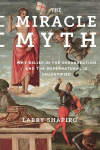Whether it’s the Christmas miracle, the dreidel proclaiming that “a great miracle happened there,” or Saturday Night Live poking fun at the miracle narrative, ’tis the season for miracle mentions to become commonplace. To believe in miracles or not is a question many of us have contended with at one time or another, but for New Atheists and their fellow travelers, the more pertinent question is whether such belief is damaging.
For them, skepticism has become an evangelical endeavor. It’s not enough to sit in the corner and quietly disbelieve; they must spread their disbelief at the point of rationalism’s sharp sword. Like an enlightened imperial conqueror, the skeptic will liberate you from the weight of tradition and superstition—whether you want to be liberated or not.
There are less belligerent skeptics out there. Philosopher Larry Shapiro is not among them. His new book, The Miracle Myth, is written in a friendly style, but it is, nonetheless, a very aggressive brief against belief in miracles. “I have no patience for hopers or wishers,” he declares with irritation in the introduction, and his goal is to make those hopers and wishers stop it already with their tedious hoping and wishing.

The Miracle Myth: Why Belief in the Resurrection and the Supernatural is Unjustified
Larry Shapiro
Columbia University Press, August 2016
Belief in miracles, Shapiro argues, is unjustified and unsustainable. It is also, he insists, immoral. To believe that Jesus rose from the dead, Shapiro says, is a failure of both reason and ethics. He directs the book toward those who still believe, in an effort to get them to convert. One imagines Shapiro showing up at a church and pressing copies of his book on unsuspecting Christians. “Excuse me, ma’am, but I wanted to talk to you about Jesus Christ, who is not our savior…”
I’m skeptical that Shapiro’s skepticism is actually going to persuade the folks he seems to think he’s persuading. In fact, it’s not even clear that he could persuade a true skeptic. Shapiro makes a strong case that a belief in miracles is unreasonable, but he seems unwilling (or perhaps unable) to provide actual evidence for his claim that something about a belief in miracles is immoral.
The Miracle Myth is a smart rationalist critique of miracles, although the argument is familiar: Miracles are by their nature extremely improbable events, occurring outside the natural order of things; if miracles are replicable and predictable, they aren’t miracles; the sun coming up every day is perhaps amazing and impressive, but it isn’t miraculous; etc. Because miracles are so unlikely, he writes, “the evidence for miracles has to be especially strong if our belief in them is to be justified.”
Of course the evidence for Biblical miracles doesn’t rise to this high standard. We have no firsthand testimony, and accounts of Jesus’ life were all written long after his death. There aren’t corroborating accounts from non-Christians, either. And even if you did accept that someone rose from the dead, Shapiro adds, there’s little reason to extrapolate from there to divine intervention. Imagine if a bunny who was dead suddenly came back to life. What is the cause of this bunny resurrection? Perhaps an alien shot a bunny resurrection ray at earth. Maybe there’s some unexplained zombie bunny disease. These explanations are improbable, but they don’t on their face seem less likely than divine intervention.
Shapiro does acknowledge, grudgingly, that it’s okay to believe in miracles if that belief has no real effect on you. You can believe that the bunny rises from the dead as long as you don’t devote your life to worshipping the bunny. But if belief in miracles leads you to “spend a great deal of money to send your children to a private religious school,” or if it leads you to “vote for politicians who would forbid abortion or who work to prevent gay marriages,” then, Shapiro says, “You’re at fault.” Belief in miracles, Shapiro concludes, leads to intolerance, retrograde politics, and wasted time, money, and effort.
Again, this isn’t breaking any new ground. Just as there’s an infinite demand for books touting the virtues of coming to Christ, so there seems to be endless enthusiasm for righteous skeptics telling each other about their righteousness. Despite the repetition, or perhaps because of it, the presentation is less than convincing. Shapiro’s book is an extended insistence on the need to always justify one’s beliefs.
But what of Shapiro’s argument that belief in miracles is unethical?
The justification for this claim is surprisingly thin. It relies on anecdotal evidence that conflates causality and correlation. And it’s easy enough to point to counterexamples like the work of Christian Abolitionists, many of whom no doubt believed in miracles, for which Shapiro has no explanation.
Shapiro does note that, for some, religion isn’t about miracles. It’s about “belonging to a religious community.” But if a community is organized around the miraculous or the divine, how do you separate the faith and the community?
This isn’t an incidental question. Shapiro is so eager to unlink abstract ideas from their real-life contexts that he’s often blind to the ways that both belief and skepticism are tied up with particular social relationships. Throughout the book, Shapiro suggests that people with expertise, people with standing—people, in short, with power—should be believed, while those without it should be mistrusted.
“Whom would you sooner trust about the occurrence of some unusual event—a well-educated person who has been trained to think critically…or a person with little education who is superstitious and largely inexperienced in the way of the world outside his or her small domain?” he asks. It’s an argument from authority—which, of course, is exactly how the church defended its viewpoint for some centuries. And, as with the church, that argument from authority raises uncomfortable questions. When the poor say that they are harassed by police, for example, do we credit them? Or do we dismiss them because, for the well-educated, harassment is an unusual occurrence?
The point here isn’t that you should believe in aliens, or that skepticism leads inevitably to police brutality. Rather, it’s that beliefs exist in the context of relationships, communities, and power structures. It’s worth remembering this when someone like Shapiro makes such a strident argument for the correctness of his own beliefs.
Philosopher of science Paul Feyerabend was familiar with Shapiro’s approach when he wrote his (in)famous monograph Against Method back in 1975. Feyerabend didn’t necessarily believe in miracles, but he was skeptical of skepticism. Science and reason, he felt, were not quite as systemic as their proponents liked to believe. Science, for Feyerabend, had holes in it—and those holes could be, and sometimes were, filled with things and theories and ideas from outside science: voodoo, Chinese medicine, perhaps even stories about miracles.
For Feyerabend, you don’t build theories out of facts. Rather, theories determine which facts you can see. And if that’s the case, how do you know whether that miracle you’re doubting is truly improbable? Maybe you’re just missing the theory that makes it conventional wisdom.
Feyerabend’s radical skepticism is hard for even the most hardcore skeptics to swallow. But even if you’re not willing to go that far, his relativism has a strong, and convincing, ethical component. Different people see the world differently, and so see both facts and miracles differently. Unless you are very, very sure that your own worldview is not just true, but also likely to lead to joy and moral improvement for all human beings, it’s best to be cautious about how, and with what force, you impose your insights.
Feyerabend linked that skepticism to a defense of pluralism. “In the years around 1964, Mexicans, blacks, Indians, entered the university as a result of new educational policies,” Feyerabend writes, “Many people in the university were excited. What an opportunity for a prophet in search of a following! What an opportunity, my rationalist friends told me, to contribute to the spreading of reason and the improvement of mankind! What a marvelous opportunity for a new wave of enlightenment.” But, Feyerabend says, “I felt very differently.”
Who was I to tell these people what and how to think? I did not know their problems, though I knew they had many. I was not familiar with their interests, their feelings, their fears, though I knew that they were eager to learn….Their ancestors had developed cultures of their own, colourful languages, harmonious views of the relation between people…whose remnants are a living criticism of the tendencies of separation, analysis, self-centredness inherent in Western thought… Yet [these cultures] were never examined with the respect they deserved…they were ridiculed and replaced as a matter of course first by the religion of brotherly love and then by the religion of science…
Shapiro sees his book as opposed to Christianity. But for Feyerabend, the evangelical Christian and the evangelical skeptic are united in a quintessentially Western project of forced assimilation. Both insist that all see by their light; other illumination is to be doused. Everyone is to follow one deity—be it Jehovah or Reason, as the case may be.
Feyerabend, for his part, would prefer a less unitary world. To him different worldviews are a resource, for science and for culture as a whole. Not everyone has the same sense of what is probable and what isn’t. And that’s a good thing. At least sometimes. In certain instances you have to balance harms; I’m sure I’m less tolerant of anti-vaxxers than Feyerabend would be. But if you happen to believe that Jesus rose from the dead—well, I think that’s between you and your God, and, perhaps, your community. If everyone thought the same way as Larry Shapiro, or as me, the world would be a duller place. The fact that different people are different is its own kind of miracle, if we let ourselves believe in it.
* * *
Also on The Cubit: “I don’t believe in God, but I’m not on Dave Silverman’s team.”





